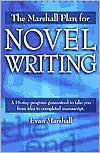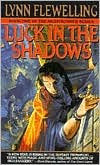Thursday, July 31, 2008
Progress on JASPER
This past week was an excellent one for my writing. I wish every week could be like this! I worked several hours each day on the JASPER story and the quality of the work was very gratifying. I managed a level of objectivity which is so helpful yet so hard to achieve, and even harder to maintain. I think it is a sign of growth that I was able to manage it. I hope I can hold onto it.
I browsed back over the past several posts and realized that I've been working on JASPER since late May, when I set aside the JACK & JILL story to give it more time to ferment. Somewhere along the way I lost track of time. On June 12th I described my current place in the JASPER story as the transition from Act II to Act III: it's where I'm still at! Yet so much has happened in the past couple of months. I have written, rewritten and edited so many times I've lost count. I have worked through several completely different versions of this sequence, trying out various possibilities, and worked through them all again. I simply stopped noticing how much work I was doing in the effort to get it right. I don't think I've ever worked this much on any particular sequence before, for any story.
At least I can now happily relate that I have finally tied it down. I have the version that works best, that is truly woven into the fabric of the story in the best way I can imagine. I got to it bit by bit through each of the earlier drafts which didn't work. Always some part of them did work, and by weaving these ideas and insights together, casting and recasting them, eventually I figured out just how to handle these events and move the story forward in a way that really holds one's attention, satisfies the story's needs, and comes across as genuine and authentic for the characters.
Through the rewrites, the length has grown to 60k, which was the original goal for the entire story -- I wanted this to be a shorter novel. This suggests a finished word count closer to 72k.
Although I have now settled on the final version of this current sequence, I haven't finished writing it. There are two more chapters to go before I'm done. The first one is already written but needs substantial shortening. The second is yet to be written. That chapter will bring all the previous chapters together and propel the Reader into Act III. I'm working on them even now.
Best wishes for your own clarity and progress,
Adrian
Tuesday, July 01, 2008
The Pillars of Perseverance
Somewhere along the way every aspiring writer comes to the realization that writing a novel is a lot of hard work. Hopefully, this realization comes early, and the writer accepts the fact and buckles down to the task at hand. We all have our own way of managing this. Some are real troopers, writing daily no matter what. Others prefer to write when the inspiration strikes them. Unfortunately, for most of us, that is too seldom and too short-lived to allow the creation and completion of a novel in anything less than several hundred lifetimes. Somewhere between the die-hard fanatic and the casual poseur, there lies a happy, healthy balance between life, work, family, hobbies, recreation, unexpected obligations, spur-of-the-moment getaways, etc., and the hard work necessary to complete a novel within a reasonable amount of time.
Oh, and did I mention that writers are also supposed to find time to read?
Yes, writers must be informed about what is going on the in the world. It is important to read about current events, to read up on history, to research topics relevant to our writing projects, and of course to read about writing in the never-ending effort to improve and expand our professional capacity and horizons. Finally, we must also read what other writers write in order to keep abreast of what is being published, and to find examples to learn from in the case of those writers who do a darned good job of it.
Currently, I am reading THE PILLARS OF THE EARTH by Ken Follett. It was one of Oprah's Book Club selections last year. It's a well-written and engaging story, the sort of novel that makes you wish you had written it yourself. It is always inspiring to find prose that is so clear, so expressive, so focused, and which sustains this high standard for hundreds upon hundreds of pages. This is the first novel I've picked up that happened to be on Oprah's list. I had a copy of it already in German, which I had begun reading but never finished. When I saw Oprah promoting it, I remembered wanting to get back to it and finish it one day, so I decided to get a fresh English copy and see how it was meant to be experienced in the original language. Some books read better in one language or the other, for some reason. I definitely like this one in English. Perhaps the fact that it is set in England has something to do with that.
In the Preface, the author writes about how he was inspired to write this novel but then put it aside. He came back to it ten years later and then took over three years to complete the process of writing and polishing it. I recognized my own struggles in his comments, particularly where he mentions that the reason he set it aside was because he realized he was not yet able to write it. When he started out, his writing skills were not sufficient for such an ambitious project. Follett also mentions that a longer novel is much more work than three novels of shorter length. I have also read in several blogs and articles on writing that a beginning writer might find it advantageous to start out writing a shorter novel, or a few YA or children's stories, in order to get the basics of storytelling down. Everybody has to start somewhere, and a shorter or simpler project helps you gain a foothold and advance your skills toward more ambitious projects.
I chose to take this good advice last year, when I shifted from adult-level novels to YA fiction. My intention was to write a few (3-5) YA novels as a way to simplify things and gain some practical experience (as well as tell some interesting and worthwhile stories!). So far, I have been very happy with that decision, and with my progress. This approach has been particularly helpful for me because I tend to make things more complicated the longer I work on them. It's happening even now with my current project, the JASPER story. As the novel winds into the third act, it should become more focused, more driven, the momentum increasing, the expectation rising, a clear sense emerging that all that has gone before has led to this moment and that this moment is inextricably leading toward something, and not just anything, but something which was ordained from the start, and which will reward the Reader with a gratifying pay-off (and reward me, too, by the way -- I also enjoy the thrill of seeing the story pull together and end well). Nonetheless, when everything should be clear, I find myself constantly seeking new twists, new surprises, the unforeseen shift that will make the Reader (and me) gasp with surprise and awe. I still seek a deeper significance, a way to draw out the themes, a profundity that frankly oversteps the requirements or the expectations of the genre. I need to remind myself that it is only a story, and that I must finish it, and just accomplishing that much is already accomplishing more than I have accomplished previously: I have yet to send a manuscript out the door!
A work like PILLARS inspires me to carry on, to keep things in perspective, to remember that other writers have passed this way, too, on their way toward meeting their personal goals. As Follett writes in his Preface, we must write the sort of stuff that we're good at, that rings true according to our unique talents. It is sound advice to start small, acquire the skills you need, and then carry on until you reach your ultimate goals. There are many stories within us, many great stories just waiting for a chance to be written. They will be, if we persevere.
Wishing all aspiring (and published) writers progress toward their goals,
Adrian
Subscribe to:
Comments (Atom)







